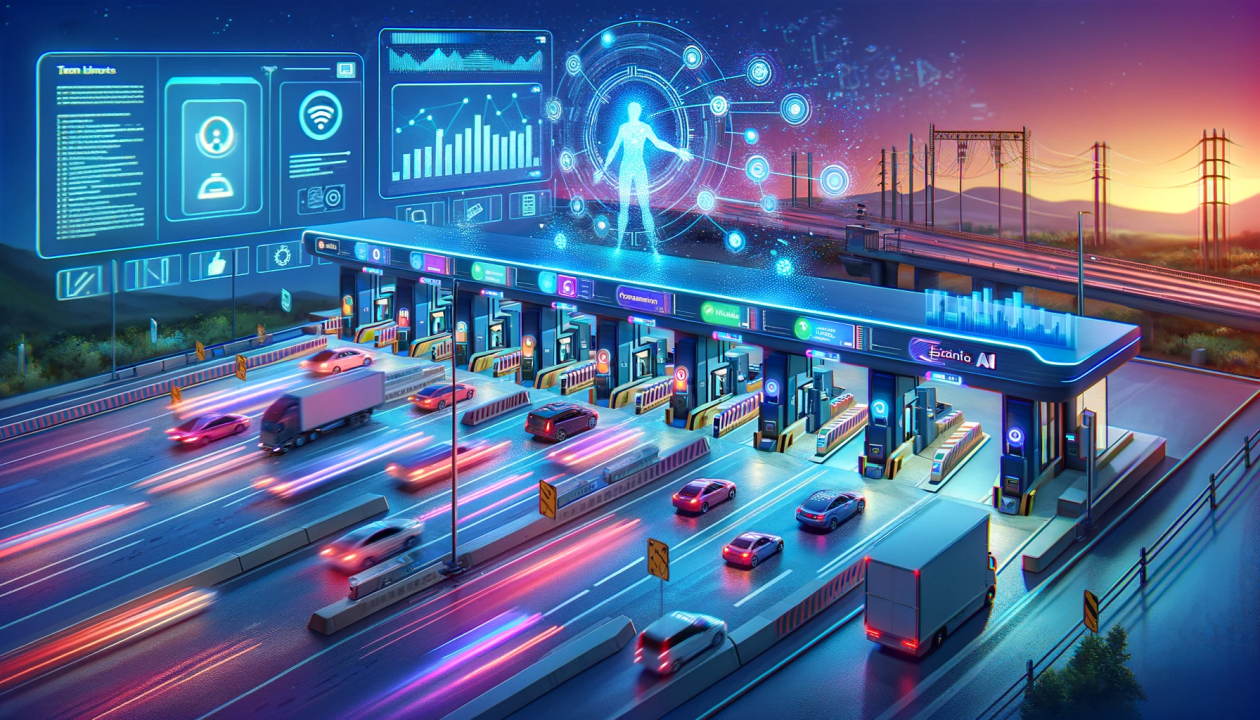- By - Joe Soliz
- November 13, 2024
- Comments (0)
As the demand for efficient and reliable transportation infrastructure grows, electronic toll collection (ETC) systems have become a cornerstone of modern roadway management. Integrating Artificial Intelligence (AI) in these systems is revolutionizing how toll collection providers and toll back offices operate, enhancing accuracy, reducing costs, and improving user experiences. Here’s a deep dive into how AI is driving this transformation.
Enhancing Accuracy and Efficiency
Automated Vehicle Identification: Traditional toll systems rely heavily on manual verification and RFID technology. AI enhances these processes by employing computer vision and machine learning algorithms to accurately identify vehicles and license plates. Advanced image recognition systems can process high-speed video footage, ensuring accurate vehicle classification and reducing the likelihood of errors.
Dynamic Pricing Models: AI enables dynamic pricing models based on real-time traffic data, historical patterns, and predictive analytics. By adjusting toll rates according to traffic conditions, AI helps to manage congestion, optimize roadway usage, and generate revenue more efficiently.
Predictive Maintenance: Maintaining toll collection hardware is crucial for seamless operations. AI-driven predictive maintenance systems analyze data from various sensors to predict equipment failures before they occur. This proactive approach minimizes downtime, reduces maintenance costs, and ensures consistent service availability.
Optimizing Back Office Operations
Data Analytics and Reporting: AI-powered analytics platforms can handle vast amounts of data generated by ETC systems. These platforms provide real-time insights and detailed reports on traffic patterns, toll revenue, and operational performance. By leveraging these insights, toll operators can make informed decisions, improve strategic planning, and enhance efficiency.
Fraud Detection and Prevention: AI algorithms excel in identifying irregularities and patterns indicative of fraudulent activities. By continuously monitoring transactions and flagging suspicious behavior, AI helps toll operators mitigate revenue losses and enhance security measures.
Customer Service and Support: AI-driven chatbots and virtual assistants provide round-the-clock customer support, addressing queries, processing payments, and resolving issues swiftly. These AI systems can simultaneously handle high volumes of interactions, ensuring that customer service remains prompt and effective.
Improving User Experience
Seamless Toll Payments: AI facilitates seamless toll payments through various digital channels, including mobile apps and online platforms. AI enhances commuter convenience by offering multiple payment options and ensuring swift transaction processing.
Personalized Services: AI enables the personalization of services based on user preferences and travel patterns. For instance, frequent travelers can receive tailored notifications about toll discounts, route suggestions, and traffic updates, enhancing their overall travel experience.
Enhanced Privacy and Security: AI ensures the security and privacy of user data by employing advanced encryption techniques and robust cybersecurity measures. By safeguarding sensitive information, AI builds trust and confidence among commuters.
Future Prospects
Integrating AI in electronic toll collection and back office management is the beginning. As technology evolves, we can expect even more sophisticated AI applications, such as autonomous tolling systems, advanced traffic management solutions, and enhanced interoperability between different tolling networks.
In conclusion, AI is not merely an enhancement to existing ETC systems but a fundamental shift towards more intelligent, efficient, and user-centric tolling solutions. By embracing AI, toll collection providers and back offices can stay ahead of the curve, ensuring sustainable growth and superior service delivery in the rapidly evolving transportation landscape.
Joseph L. Soliz
Visionary Advocate for Transportation Technology
